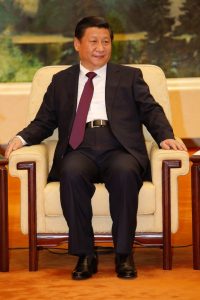Memo #295
By Elizabeth MacArthur – e.macarthur [at] alumni.ubc.ca
 In a speech made shortly after coming to power in the fall of 2013, Chinese President Xi Jinping famously vowed to crack down on CCP and State corruption by “upholding the fight against tigers and flies”. Over a year later, he has made good on his promise, prosecuting the largest number of high and low level officials (‘tigers’ and ‘flies,’ respectively) since the start of the post-Mao era.
In a speech made shortly after coming to power in the fall of 2013, Chinese President Xi Jinping famously vowed to crack down on CCP and State corruption by “upholding the fight against tigers and flies”. Over a year later, he has made good on his promise, prosecuting the largest number of high and low level officials (‘tigers’ and ‘flies,’ respectively) since the start of the post-Mao era.
Xi’s willingness to purge high-level officials has undoubtedly contributed to his widespread popular support within China. His efforts have also helped to repair the CCP’s legitimacy, which has suffered greatly in recent decades at the hands of flagrant official corruption and graft. However, President Xi’s anti-corruption campaign is also part of a larger personal power struggle. A closer inspection of the high-level officials prosecuted reveals a pattern: many of those of those individuals targeted are Xi’s political opponents. These include Zhou Yongkang, a member of former president Hu Jintao’s Politburo Standing Committee (PSC), a domestic security leader with powerful interests in the oil industry, and a well-known supporter of Xi Jinping’s now-purged rival, Bo Xilai. In addition to Zhou, Xi’s campaign has also targeted many of the influential Party leaders and CEOs who opposed Xi’s liberal economic reforms of the ailing state-owned enterprise sector.
Xi Jinping is not the first Chinese president to couch an ousting of political opponents in the form of a crackdown on corruption. Former Presidents Jiang Zemin and Hu Jintao launched large-scale anti-corruption campaigns in 1995 and 2006 respectively to purge major rivals. This Leninist tradition of winner-takes-all politics is encapsulated by the Chinese idiom “Nǐ sǐ wǒ huó,” literally, “you die, I live.”
However, President Xi’s campaign is larger in both scale and scope than those of his recent predecessors. By targeting politburo members, and even a member of the previously untouchable PSC, Xi has arguably managed to consolidate more power than any leader since Deng Xiaoping. Thus, it will be easier for him to push through difficult economic reforms. However, Xi’s willingness to regularly jail anti-corruption activists and Charter supporters suggests that major political or legal reforms are unlikely in the near future.
About the Author:
Elizabeth MacArthur is a graduate student in the Masters of Asia Pacific Policy Studies (MAPPS) program at the University of British Columbia (UBC), and a Fellow at UBC’s Institute of Asian Research. Her memo derives from a larger study, “你死我活 (“You Die, I live”): Xi Jinping’s Anti-Corruption Campaign, Fighting Tigers, and Consequences for the Rule of Law in China.”
- Links:
- Joseph Fewsmith, China Since Tiananmen. Cambridge University Press, 2008
- Joseph Fewsmith, “Elite Politics,” in Merle Goldman and Roderick MacFarquhar (eds.), Paradox of China’s Post-Mao Reforms, Harvard University Press, 1999
- Cheng Li, “Xi Jinping’s Inner Circle (Part 1: The Shaanxi Gang),” China Leadership Monitor 43 (2014)
- “China’s Xi Purging Corrupt Officials to Put Own Men in Place: Source,” Reuters, April 2014
- Wen-Ti Sung, “Is Xi Jinping a Reformer?” The Diplomat, March 2014
Related Memos:
See our other memos on China.

Comments are closed, but trackbacks and pingbacks are open.